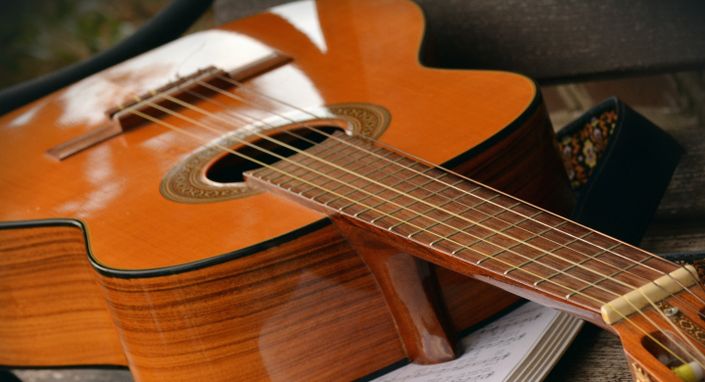
Know Every Note
Memorize every note on the fretboard, COLD!
Have you ever met a guitarist who can totally rip, but only sometimes?
They’ve clearly been playing long enough (longer than they’d like to admit) to learn a handful of songs and techniques really well. But something’s holding them back.
For all those impressive gimmicks, they don’t actually know their way around the fretboard that well. They couldn’t tell you the names of hardly any of the notes they’re using.
Are you that guitarist?

Why don’t you know the whole fretboard yet?
Learning the names of the notes is dead simple on the piano, and it’s a logical first step on many other instruments. But guitarists have earned a reputation for rarely having any clue what notes they’re playing.
There’s plenty of merit to that stereotype, but it’s not without cause. Memorizing the guitar fretboard is a monumental task! It’s one thing to know how the fretboard works, but knowing every note as effortlessly as you can identify colors or letters is on a whole new level. So it’s understandable if you’re lacking in this area.
If some of these describe you, you are not alone!
- You know the notes on the E strings and sort of on the A string, but you rely on octave shapes for the rest of the strings, so they’re pretty fuzzy.
- You feel like you’ve lacked a fundamental vocabulary of music for decades, always thinking about shapes rather than notes, and it shows in your playing.
- Your biggest problem is trying to find time to practice what you're learning.
- You can eventually find any note on the fretboard, but naming or finding notes quickly seems impossibly elusive. You feel like your memory just isn’t up to the task.
- Repetition doesn’t seem to work.
- Naming notes in descending order, going backwards through the alphabet, is more challenging than you expected.

How would you be better off if you knew every note on the fretboard?
While your plight of fretboard ignorance is understandable, you still know it’s holding you back. Imagine the doors that would open up if you could get over this hurdle.
- Knowing what to play and where to find it without thinking about it is a huge confidence booster. You'll feel like you know what you're doing for a change.
- You’ll be able to learn how to read music. Non-guitarists who read music all the time might not think of you as a Neanderthal anymore!
- When you can access this fundamental vocabulary effortlessly, you remove the mental friction preventing you from comprehending more advanced concepts.
- It will be easier to figure out multiple ways to play the same chords, scales, and licks.
- It will be easier to find chord tones while soloing.
- Open up communication channels with other musicians. When you know the notes really well, you can use them effortlessly when conversing with those playing other instruments.

Here’s how you’re going to learn it.
As I’ve mentioned already, this is a huge task in front of you. Just remember that it is finite and totally achievable.
We'll break it down like this.
- Learn how to name all the notes slowly, writing out your own map of the fretboard.
- Master several shortcuts, one by one. Each of these would rightly be called a crutch when used in isolation, but when all used together, it’s more like knowing your way around a neighborhood from many different perspectives.
- The shortcuts you’ll learn aren’t substitutes for knowing the whole fretboard cold, but orienting yourself to the landscape takes the pressure off. When you know you can quickly and easily find any note because you always know something close by, your confidence will carry you through the final steps toward complete memorization.
- Memorize the E and A strings, cold. Everything else is an octave shape away. That’s only one step removed.
- Memorize the rest of the fretboard with a series of exercises that take the notes out of context, away from predictable patterns.
- Integrate your knowledge of the notes with your knowledge of shapes and patterns.

"It was inevitably an accident if I stumbled upon a sweet sounding note. Once I started getting better at finding notes on the fretboard, it started happening far more frequently. Learning the notes meant I could start charting a path to that same sweet sounding note someplace higher or lower on the neck. Progress in this area improved my playing far more than anything else I’ve done."
Rex Walters, customer
Get started now!
Your Instructor

Since 2011, Joe has helped hundreds of private guitar students achieve their musical goals. Drawing from deep backgrounds in computer science and jazz guitar, Joe creates simple, systematic approaches to learning intermediate and advanced guitar skills.
Course Curriculum
-
StartThe Most Important Strings: E and A (2:31)
-
StartRaces vs. Metronome vs. Music (3:40)
-
StartE/A Strings: Natural Notes (4:58)
-
StartE/A Strings: All Notes, Sharps (2:46)
-
StartE/A Strings: All Notes, Flats (2:15)
-
StartAll Strings: Natural Notes (4:06)
-
StartAll Strings: All Notes, Sharps (2:48)
-
StartAll Strings: All Notes, Flats (2:30)
-
StartSnake Through the Frets (2:47)
-
StartName Every Note Out Loud (3:22)
